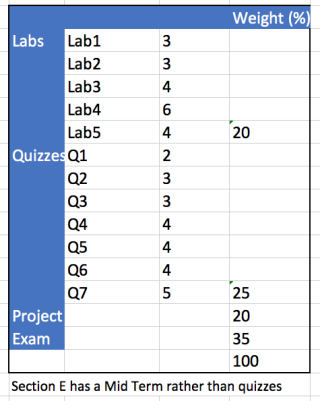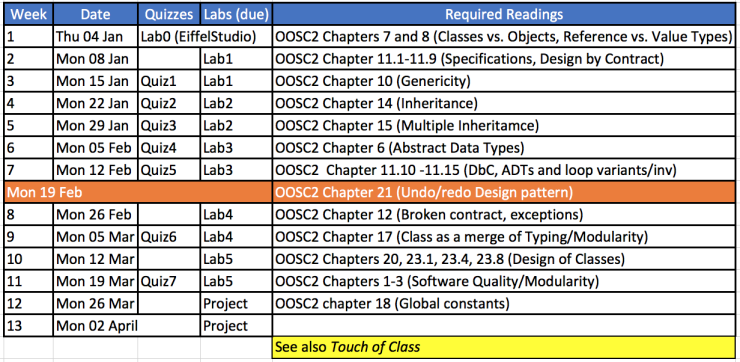Table of Contents
3311 Winter 2018
- UIT Moodle Page Section Z only (for iClicker)
- UIT Moodle Page for Sections E and Z (for submission of documentation for Lab4 and Project)
Dates Winter 2018
- Thursday January 4 - Winter Classes Start
- February 17-23 - Reading Week
- Friday March 9 - Last date to drop course without receiving a grade
- Thursday April 5 - Last date to submit term work
- Project Due Date - Thursday April 5 - 11am. In addition to the electronic submission, you must submit your Report.pdf to Moodle.
- Friday April 6 - Classes end
- April 9-23 - Exams. This is closed book exam, but you may bring one data sheet (US Letter, both sides).
Lab/Quiz dates:
- Thursday January 4: Lab0 and Lab1 released. Lab0 is not graded, but Lab1 is due by Friday, 19 January, 4pm (sharp).
- Thursday, 18 January: Quiz1 (for section Z) is during the scheduled Labs.
- Thursday, 25 January: Quiz2 (for section Z) is during the scheduled Labs.
- Thursday, 01 February: Quiz3 (for section Z) is during the scheduled Labs.
- Friday, 02 February, 4pm: Lab2 submission is due
- Thursday, 08 February: Quiz4 (for section Z) is during the scheduled Labs.
- Thursday, 15 February: Quiz4 (for section Z) is during the scheduled Labs.
- Friday, 16 February, 4pm: Lab3 submission is due. After the Friday 4pm deadline we will no longer be able to help you with your submissions and with forum assistance on the Lab. However, at your own risk, you may submit code up to 11.30am Tuesday 20th February without penalty. After that we will not be able to grade your work.
- Thursday 08 March: Quiz6 (for section Z) is during the scheduled Labs.
- Friday 09 March 4pm: Lab4 submission date (strict, after that we will not be able to grade your work).
Please report any issues with your grading within one week of receiving your grade/feedback.
Grades
- [20%] 5 Labs. Each student does their own work and submits their own work. Each Lab requires submission of code implementing a design, and a short design document.
- [25%] 7 Quizzes, based on the Labs and work covered in class. Quizzes are in network secure Labtest mode. You have access to the EiffelStudio IDE.
- [20%] Project [10% correctness and 10% Design Document]. Work in teams of at most two students. If one member drops out for whatever reason, the other member is still obligated to submit. So ensure that you understand and store all components of the Project in a shared but private area (e.g. in a private area of GitHub).
- [35%] Final Exam
Grading of Lab4 is divided into two parts: (1) the correctness of your submitted design/code is tested with a grading script (2) your written Report.pdf (submitted via Moodle) is graded by a TA.
Due Dates and Readings
Before doing Lab1, you will want to familiarize yourself with Eiffel, the Eiffel Method and the EiffelStudio IDE. See here.
Labs are due on Friday by 2pm (strict). Quizzes are based on the Labs, readings and course work of the previous week. Quizzes are held during the Labs every Thursday..
Readings
- The Required Readings listed above are are available to you online in the course SVN (be sure to sign in on this wiki bottom/right).
- The SVN also has slides contrasting Java and Eiffel
- Review basic Eiffel Syntax/semantics here. The basic properties of the Eiffel method will be assumed in quizzes etc. Spend your first week obtaining familiarity with the syntax and familiar use of the EiffelStudio IDE. You will need it.
WorkLoad
This course is work intensive and it is expected that you will be doing at least 10 hours of work per week.
At times (e.g. in the Project) you are allowed to work on your own or in a team of at most two. If you are working with a partner, be sure to create a shared storage area (e.g. a private GitHub repository) where you both have access to the design/code. You will want to ensure that you each understand the other's work. In case a partner withdraws from the course or does not contribute, you are still responsible to ensure that you submit the work for the complete project on your own (with an explanation of the context in which this happened).
Feedback
You can view your marks here.
You may obtain feedback on your Labs via the command line by doing:
>feedback 3311 Lab1 >feedback 3311 quiz1
The grade for your Lab Reports will be available on Moodle.
Letter Grades
For each grading unit you are assigned a raw mark score that ranks you in the class. Also, you will be provided with a mapping from your raw mark score to a letter grade. The raw mark score is not a grade as it is merely used to rank you in the class (so, e.g. a raw mark score of 76 might be a C, not a B+, after the mapping is applied). The mapping will be supplied to you at the same time that the grading unit is handed back to you. The final grade is computed from the cut-offs as shown here.
On marks and marking
- A raw mark numerical score on a lab, quiz, project or exam is never “out of” anything, in that it is not interpreted or converted to a percentage. It is the sum of scores assigned to questions, occasionally individually adjusted where appropriate. A numerical raw mark numerical score is used to compute the letter grade in cases where there are many sub-questions in a single piece of work.
- Marks are not “belled” or “curved”, in the sense of being adjusted to approximate a normal distribution. They usually aren't normally distributed anyway in statistical terms and I know of no statistical transformation such as normalization which would make the scores more meaningful and/or accurate.
- You can't “lose marks” for anything - you didn't have them to begin with. Letter grades are assigned to raw mark numerical scores on a basis which I feel is both fair and reflects the meaning of each letter grade as determined by the York Senate and published in the York Undergraduate Programmes Calendar and referenced above.
- Only the letter grades have meaning as determined by the cut-offs posted as each assignment unit is handed back.
- Marks are not a judgement on your intelligence or diligence or good intentions; they are just a reflection of the work you handed in. If you were very busy with other work, or recuperating from an illness, or emotionally stressed, it would be not be surprising if your mark was lower than under optimal conditions. However, a reason does not function as an excuse and does not provide a basis for altering the mark, which is a description of what you did, not why you did it. Work that is submitted late generally receives a grade of F.
Missing deadlines
- If you miss the deadline for the Labs, or project then your grade will be an F.
- If you miss a weekly Quiz, your grade will be an F – unless the York attending physician's statement (July 2017) is filled out in detail and the physician certifies that you were unable to write due to illness at the time of the quiz. You must inform the instructor immediately you are able to, that you cannot write the Quiz, and you must present the Physician's statement to the instructor the day after the Quiz. Alternative arrangements for the Quiz grade will then be made. Similar requirements apply to the exam.
- The entire Lab or Quiz may be regraded. Similar requirements apply to the exam.
Re-grading
If you have any issues with your grade, whether on your Labs, Quizzes, Lab Reports, etc, please print out your feedback, add your name and Prism login, write down clearly and precisely where and what your grading issues are, and hand the feedback to your instructor. This must be done within one week from the date the grades are announced. Your request must spell out the relevant part or section of the assignment what grade you did get, and what you feel your grade should be for that part.
If you want your Quiz, Lab, or Project regraded, then within one week of receiving the feedback do the following:
- Write out precisely and concisely your concerns.
- Staple your written concerns to your feedback document
- Return the above to the instructor within one week of receiving your feedback.
Group work
At times (e.g. in the Project) you are allowed to work on your own or in a team of at most two. If you are working with a partner, be sure to create a shared storage area (e.g. a private GitHub repository) where you both have access to the design/code. You will want to ensure that you each understand the other's work. In case a partner withdraws from the course or does not contribute, you are still responsible to ensure that you submit the work for the complete project on your own (with an explanation of the context in which this happened).


